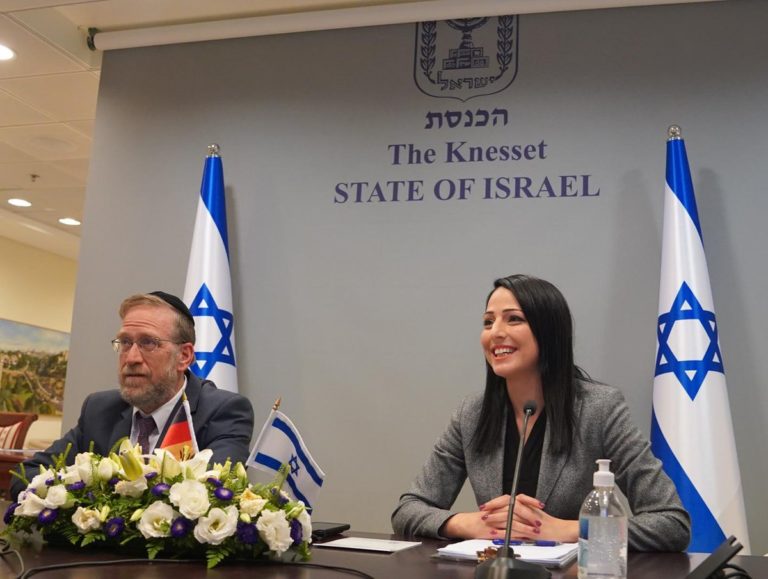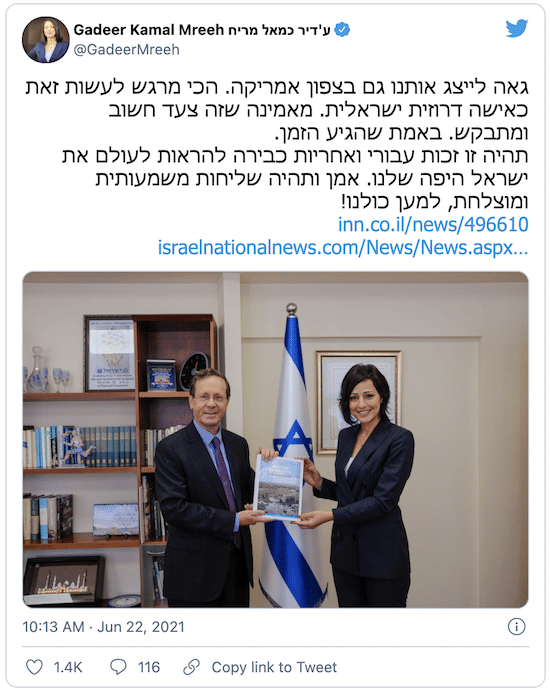
Listen:
We’re curious…
The Jewish Agency — which works to strengthen connections between Jews across the globe and Israel — just announced its newest emissary to the U.S.: Gadeer Kamal-Mreeh, an Israeli Druze woman who previously served in the Knesset. Mreeh’s appointment is unprecedented, and many would be surprised that a person representing the Jewish agency is, well, not Jewish.
But here’s why this appointment is actually not that surprising: Mreeh is a perfect representation of Israel’s polychromatic society and cultural pluralism. She is an Israeli citizen and isn’t Jewish. She is Arab but not Muslim (she’s Druze). She describes herself as “the successful career, liberal, Western woman, and, at the same time, the simple woman who participates in traditional ceremonies, funerals and weddings.” In her varied career, Mreeh has worked as an evening news anchor, Knesset member and medical technician.
These paradoxes could drive many in Mreeh’s position to have an identity crisis, but she embraces them as a strength. “Being a mix of all these factors… enriches my identity, expands my opportunities and helps me to deal with things differently,” Mreeh has said.
Now, the 36-year-old is beginning the next chapter of her journey as the Jewish Agency’s first Druze emissary to the U.S. Based in Washington D.C., Mreeh will lead efforts to connect with North American college students about Israel.
Daniel Elbaum, president and CEO of Jewish Agency International Development (JAID) and head of North America at The Jewish Agency for Israel, said in an email that Mreeh is uniquely positioned to convey the diverse reality of Israel. It is “extremely important for Jews (and non-Jews) to understand the real Israel,” he explained, noting that one in four Israelis is not Jewish. “Like any minority in any country, they face challenges, but they are also judges, doctors, business executives, journalists, and, yes, members of government. Gadeer’s story is Israel’s story, and we know it is an important one for Americans to hear.”
“Proud to represent us in North America,” Mreeh tweeted in Hebrew to her Israeli followers. “It is most exciting to do so as an Israeli Druze woman… It will be a privilege for me, and a great responsibility, to show the world our beautiful Israel.”

Who are the Druze?
The Druze (pronounced “drooz”) are a distinct religious and ethnic group dating back to the 10th century, when they broke off from Islam in Egypt. The Druze consider themselves Arab and speak Arabic. Their monotheistic faith blends elements of Islam, Hinduism and classical Greek philosophy. However, their actual beliefs are secrets and are closely-guarded by their religious leaders. Some argue that many of their esoteric teachings are kept a secret in order to prevent people from misunderstanding them.
The community numbers about one million people worldwide, with the largest populations living in Syria and Lebanon. In Israel, the Druze population is about 143,000 people (which is less than 2% of the country’s total population). They mostly live in the northern regions of Carmel, the Galilee and the Golan Heights.
Based on a religious obligation, Druze are fiercely loyal citizens to the country in which they live. In Israel, this is illustrated by the fact that 85% of Druze men serve in the IDF, primarily in combat units. This is actually higher than the percentage of Israeli Jews who serve in the army (at a rate of 73%). As of 2017, 421 Druze had died fighting in the IDF or in terror attacks. The Druze relationship with the Jewish state is referred to as a “covenant of blood” or “brit damim.” This term evokes their shared sense of loyalty, allegiance and sacrifice. (Watch this short segment by Israel’s Channel 10 showing the deep sacrifice made by the Israeli Druze community.)
The Druze community is highly represented in Israel’s government, serving as Knesset members, diplomats and IDF officials. Relative to the small size of their population in the country, they are integrated into Israeli society at an extraordinary level. At the same time, the Israeli Druze experience has been far from perfect.
In 2018, many Israeli Druze were enraged when the Knesset passed the controversial nation-state law. At the time, tens of thousands of Druze gathered in Tel Aviv to protest against it. Though mostly symbolic, the legislation declared that Israel is the national home of the Jewish people — without reiterating equality for all Israeli citizens (as it does in Israel’s Declaration of Independence). The legislation also gave Arabic a special status, leaving the Druze and other Arabic speakers feeling their language was not on equal footing with Hebrew. Samir Al-Assad, an Israeli Druze Lieutenant Colonel, expressed the sentiment many in his community felt: “Israel is my country, I am proud to be an Israeli. But this law made me feel humiliated.”
But despite these challenges, the bond between the Jews and Druze appears to be strong. Even in the wake of protests against the nation-state bill, most Druze said they would still continue to serve with distinction in the army because it’s their country and they are Israeli. Amal Nasser el-Din, a former Druze member of the Israeli government, explained: “The state of Israel is a Jewish state as well as a democratic state that espouses equality and elections. This is a blood pact and a pact of the living.”
How the Druze and Jews became close
The bond between the Druze and Jewish communities goes all the way back to Biblical times. The Druze regard the Biblical figure Jethro — the high priest of Midian and Moses’ father-in-law — as their ancestor, chief prophet and spiritual founder. Jethro became Jewish and was dedicated to helping the people of Israel, so it makes sense that the Druze would feel a strong connection with the Jewish people.
The Jewish and Druze communities began forging alliances in the days of the British Mandate of Palestine. During this period, conflicts erupted between the Druze and Muslim communities from time to time. Rami Zeedan, a professor at the University of Kansas who specializes in the history of Druze in Israel, explained: “Both communities were minorities at that time,” Zeedan said. “So some Druze villages established individual alliances with the Jewish communities around them.”
On the eve of Israel’s 1948 War of Independence, the Jewish and Arab communities each pressured the Druze to join their side. Initially, many Druze leaders preached a stance of neutrality in the conflict. According to Yoav Gelber, a history professor at the University of Haifa and author of “Jews and Druze in the War of 1948,” there was a difference of opinion among Druze leaders about whether this neutrality was a mask to conceal their real position of support for the Jews, or whether their position was actually impartial. Meanwhile, Gelber writes, “the IDF, the Foreign Ministry and Daat (or the “Political Department”), the predecessor of the Mossad (Secret Service), were all active… in cultivating the Druze connection.”
The Jewish community’s efforts ultimately prevailed, and the Druze community fought by Israel’s side during the 1948 War of Independence. The communities grew closer following the establishment of the state. In 1956, Israel passed a law extending mandatory military service to Druze men. While some historians argue that the Druze agreed to send their community members to the army due to pressure from the Israeli government, others say the Druze leadership actually asked the government to make the change, based on their belief that military service would help their efforts to integrate into Israeli society.
Why is a Druze representing the Jewish Agency?
Mreeh said in a statement that her appointment to the Jewish Agency would “enable another Israeli voice to be heard, conveying the multifaceted reality of Israel to both Jewish and non-Jewish audiences.” She added, “My unique identity as a woman from the Druze community will greatly contribute to my service — resulting in meaningful and innovative activities that will challenge and change perceptions.”
Indeed, many people would be surprised to learn that there are many more religious and ethnic groups who live in Israel, beyond just Jews and Arabs. The Jewish state’s diverse population also includes Christians, Druze, Bedouins, Circassians, Bahai and other groups.
Elbaum, the head of North America at the Jewish Agency, said Gadeer’s primary role will be “to bring her unique perspective to the discussion about Israel in North America,” adding, “Gadeer is the right person in the right city at the right time to make a real impact in how Israel is understood.”
Mreeh has called her own experience “a model of successful minority integration” in Israel. In 2017, she made history as the first non-Jewish woman in Israel to anchor the evening news in Hebrew. Mreeh was initially afraid that Israeli society wouldn’t accept a Druze news anchor. However, her experience proved the opposite to be true: “The acceptance of me was amazing. People were thirsty for something else, for a new face on-screen,” she said in an interview with The Jerusalem Post.
Two years later, in the wake of the controversial nation-state law, Mreeh decided to enter politics. She broke another barrier and became the first Druze woman to serve in the Knesset. “I covered the protests against the law, and as a journalist I tried to remain neutral, but I really wanted to scream and cry out ‘What are you doing?’” Mreeh explained in an interview with The Washington Post. “My goal was to fix the law and achieve equality for all minorities.”
To become a Knesset member, she had to overcome challenges both from her own community (Druze spiritual leaders were initially uneasy with a woman serving in public office) and Israeli society at large. “The Druze community is very conservative and patriarchal,” Mreeh told The Washington Post. “That’s why we’ve not had any women in politics until now.” On the other hand, “no [Israeli] political party ever asked a Druze woman to join them.”
Mreeh’s appointment comes as many American college campuses have been the site of intense anti-Israel rhetoric and activism. Elbaum acknowledged that the challenges Israel faces on college campuses “are bigger than the appointment of one person,” but expressed hope that Mreeh could help bring students’ perceptions of Israel closer to reality.
“If Israel’s adversaries are interested in having a real debate about Israel, and not relying on misinformed and offensive comparisons, Gadeer is a proud part of that nation they malign, and she will be sharing her firsthand, candid account of her, her family and her community’s lives as Israelis.” Elbaum added, “We continue to have faith that the overwhelming number of college students, like the overwhelming number of Americans, are fair-minded and interested in learning more. Gadeer is eager to be part of that education process.”
The bottom line
Maybe what makes Mreeh a powerful representative of Israel is precisely that her identity is not one thing. After all, the state of Israel — a Jewish state that is also home to many diverse ethnic groups and demographics — isn’t “one thing” either. This has been the case since Israel’s founding: Its Declaration of Independence establishes Israel as the national homeland of the Jewish people, and also promises that it will “ensure complete equality of social and political rights to all of its inhabitants regardless of religion, race or sex.” In many ways, as fiercely loyal citizens of Israel who are not Jewish, the Druze community illustrates the paradox of Israel as a Jewish and multicultural state. Their story is a reminder that just like people, democracies and countries are complex and multifaceted. That may create some messy situations, but ultimately, as Mreeh said, being more than one thing is a good thing.
Originally Published Jun 29, 2021 12:02AM EDT
